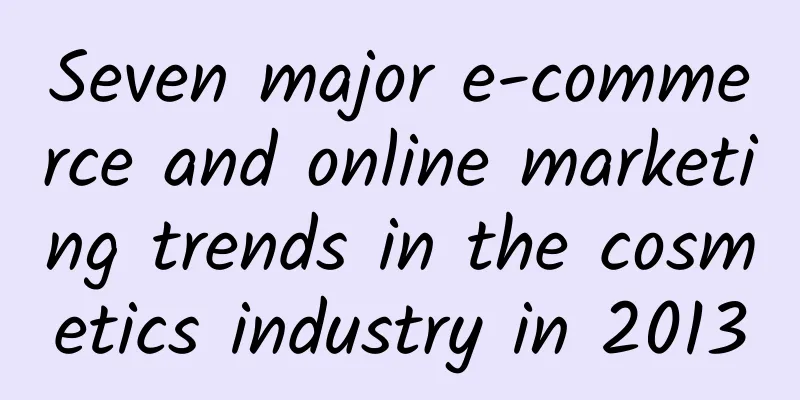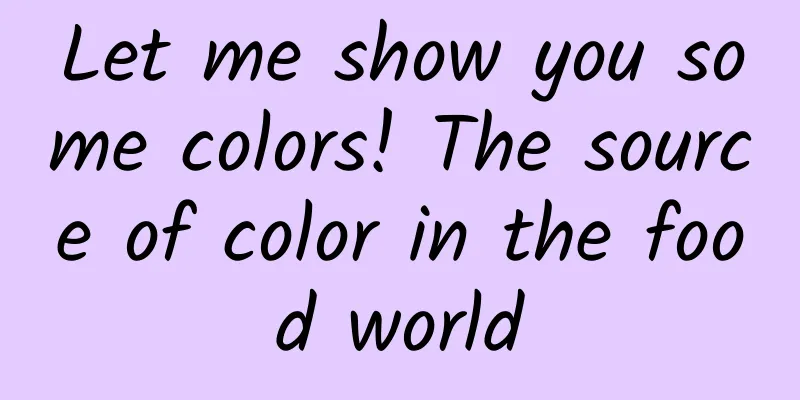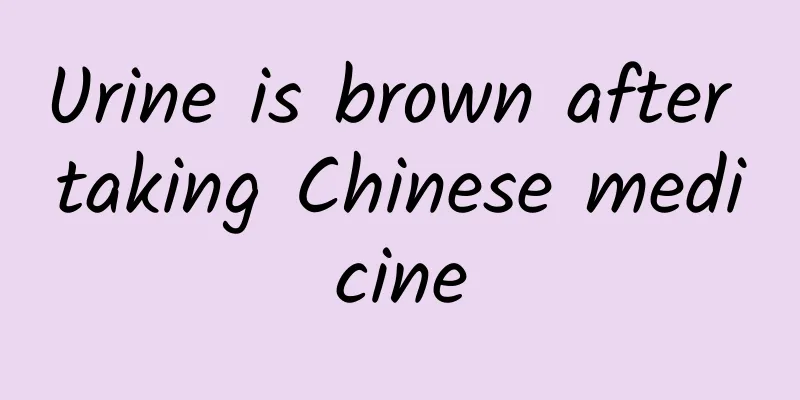Seven major e-commerce and online marketing trends in the cosmetics industry in 2013

|
In today's era, the market share of daily chemical fast-moving consumer goods is growing rapidly, and the cosmetics industry has become one of the winning forces driving economic growth. According to iResearch Consulting, as of 2012, the total market share of cosmetics in China has exceeded 200 billion, of which online shopping transactions have also exceeded 60 billion, which is basically the same as Japan's total cosmetics retail sales. The cosmetics industry is like a dark horse. While consolidating its market share in offline channels, it has also gradually gained a place in online channels such as e-commerce. Cosmetics e-commerce is about to become a dark horse in the e-commerce industry, and it has also formed a fierce impact on the traditional retail industry. The sudden emergence of many new channel merchants has also injected new blood into the cosmetics industry. Trend 1: Advertising and marketing presents a trend of "focusing on creativity" and "light on endorsements" Inviting celebrities to endorse products has always been the first choice for the cosmetics industry. According to a survey conducted by AC Nielsen, the proportion of Chinese companies using celebrities in their advertisements ranks third in the world, second only to Japan and South Korea. Since 2010, foreign brands have also begun to use local celebrity endorsement strategies, such as inviting Fan Bingbing to endorse L'Oréal Paris, Fish Leong to endorse Shiseido Pompeii, Jiang Yiyan to endorse Shu Uemura, and Tang Wei to endorse SK-II. As the star localization strategy is promoted, the battle for spokespersons has quietly begun, and local cosmetics companies are also facing unprecedented challenges. Wang Zhuo, deputy general manager of Shanghai Jahwa Group, said: "Foreign brands have successively used local big-name stars as spokespersons, and the marketing advantages of local brands have been greatly weakened. It is time to think about and seek new marketing excitement points." According to data from the daily chemical industry, more than 90% of the more than 3,000 companies in the domestic cosmetics industry have invited celebrities to endorse their products. From film and television stars to sports rookies, and even social celebrities have become brand spokespersons for the industry. When talking about the grand occasion of celebrity endorsements in the industry, an industry insider joked that "basically all domestic female stars have been invited." Due to the limited resources of celebrities, the endorsement fees of celebrities have also risen sharply in recent years: from hundreds of thousands to over 10 million yuan. The rising endorsement fees, coupled with the involvement of foreign brands, have greatly increased the advertising and marketing costs. This situation has deterred most local companies, and they have to start exploring the advertising and marketing path that is truly suitable for the development of their own brands. Liu Dongming, an expert in Internet marketing at Tsinghua University's CEO Class, believes that most cosmetics endorsements are not used well, resulting in a large amount of waste of resources; how to use creativity to further squeeze the surplus value of celebrities is worth thinking about. Teacher Liu Dongming pointed out that, for example, after Ariel invited Big S to endorse it, it named its Weibo account "Sister Lang", and its staff imitated Big S's tone to interact with fans, which invisibly extended the endorsement value. 9 sentences create hundreds of millions of value, Chen Ou's personal endorsement creates a legendary counterattack. In that 1 minute and 39 seconds shot, Jumei CEO Chen Ou plays an entrepreneur who is questioned, attacked, and smeared by the outside world, just because he is too young. At the end, he punched the glass in front of him and smashed it. After a simple bandage, he continued to step on the broken glass and move forward, "Even if you are covered with wounds, you must live beautifully." Everyone remembered this back and named the 9 lines in the shot "Chen Ou style". No other text can prove to be so valuable. "It's about hundreds of millions of dollars." At his desk, Chen Ou carefully calculated the wealth that "Chen Ou style" brought him. The most direct thing is that within a month, his certified Sina Weibo fans increased from 1 million to 1.54 million, 30,000 more than the pop singer Chen Yufan. Trend 2: Cosmetics e-commerce highlights the Matthew effect, from "28" to "19 " The "80/20 rule" is widely used in the business world, and is usually used to reflect the phenomenon that in an industry, the top 20% of brands often occupy 80% of the market share. However, with the rapid development of brand e-commerce today, this rule has been constantly rewritten. At the 2012 Tmall Cosmetics Category Tmall Merchant Meeting, Tmall Xiaoer revealed the operation of Tmall Cosmetics Category: 80% of the sales in Tmall Mall came from 13% of the brands, which surprisingly showed the "19 rule". The power of brands has been further strengthened, while the influence of platforms and channels has been weakened again. "Our operational execution and initiative can only support 30% of the transactions at most, and 70% of the transactions are driven by brands." Tmall Xiaoer analyzed. In 2012, the annual turnover of Estee Lauder, the top brand in terms of sales on Taobao (including the mall), exceeded RMB 700 million, and the cumulative turnover of the top 30 brands exceeded RMB 5 billion, accounting for about a quarter of the total turnover of cosmetics on Taobao. It is not difficult to find that the Matthew effect of Tmall Mall is becoming more and more obvious, while Taobao Marketplace has shown a clear long-tail effect. Liu Dongming, an expert in Internet marketing at Tsinghua University's President Class, pointed out that cosmetics companies must quickly enter the brand fast lane and complete the transformation from selling goods to selling brands, and from occupying shelf space to occupying mind space. Trend 3: “Word-of-mouth reviews of cosmetics” become a shopping guide for consumers According to relevant data from Baidu Data Research Center, the average daily search index of the cosmetics industry in 2012 increased compared with the past, and even reached 3.61 million searches in August. At the beginning of 2013, consumers' attention to cosmetics reputation has reached 15.3%, exceeding the attention to brands. Consumers' attention to products, brands and reputation is still far ahead of other content, and consumers' enthusiasm for direct purchases and product inquiries is also much higher than virtual information introductions. Netizens have a high degree of awareness of word-of-mouth evaluation in their choice of cosmetics, which has also made word-of-mouth evaluation an important reference for netizens to choose cosmetics. The word-of-mouth evaluation of products has gradually attracted the attention and reliance of users. In the process of selling cosmetics, the reputation of the product itself and skin care methods are the contents that netizens pay more attention to. Compared with the reputation of the product, people are more willing to know what kind of effect a certain product will bring to the user, and tend to rely on their own experience rather than just trust the product instructions. At the same time, consumers are also particularly concerned about skin care methods. More consumers are eager to understand what different effects different skin care methods can bring to the skin in addition to the products, because in traditional cosmetics introductions, there is rarely any interpretation and introduction of skin care methods; on the other hand, some skin care experts and masters have increased netizens' attention to skin care methods through in-depth answers to "skin care methods". Trend 4: Male beauty space, irresistible temptation As women care more about themselves, men will change their traditional rough image and pay more attention to skin care and other related products. This trend has already been shown. In 2012, the search for men's cosmetics increased during the holidays, indicating that men's consumption habits are mostly concentrated on holidays, which is in line with men's consumption psychology. This psychological factor also extends to the brand level. Men consume rationally and pay more attention to brands rather than emotional choices. Cleansing products are still the first choice for men to choose cosmetics, which is in line with the characteristics of men's oily skin. In addition, products that focus on male charm and temptation are sought after by the market. The male beauty trend brought about by the Lingshi effect has not diminished to this day. How to expand and refine the male market will be the focus of the development of men's skin care products in the future. Trend 5: Women act cute, and children's skin care products are popular The previously neglected children's skin care products market has also shown great potential due to changes in the market situation. In the future, women will still be the main source of household economic expenditure. By 2013, young Chinese parents may guide their children to spend more because of their excellent living environment. In addition, women may choose children's skin care products more because of their desire for youth and their trust in the non-irritating nature of children's skin care products. In the market segment, sales of cosmetics for pregnant women, mothers and babies are booming. High-end children's skin care products will become one of the markets with great potential. Trend 6: In the future, local products may surpass international brands in non-first-tier cities Although, at present, in the cosmetics display cabinets of department stores in non-first-tier cities in China, the sales of products are still dominated by foreign brands, and foreign products have a certain effect on increasing customer flow and popularity, but the relevant statistics of department stores show that it is the unknown local products that can bring considerable profits and stable customer groups to the malls and sellers. With the further development of this trend, the development space of local products in non-first-tier cities will gradually increase in the future, and may eventually surpass large international brands. Generally speaking, second- and third-tier cosmetics brands are regionally dominant cosmetics brands, and they are all based in their own bases. In order to realize the dream of becoming a national brand, their market must break through regional restrictions and extend to the whole country. Therefore, in 2013, second- and third-tier cosmetics brands must implement the market strategy of "leading the whole with a point, and integrating horizontally" to complete the strategic layout of the national market. Trend 7: Cosmetics e-commerce online sales channels are divided and polarized What are the most basic needs of consumers when buying cosmetics? Liu Yongming, founder of NALA Cosmetics, summarized that the first is "safety and authenticity", followed by functional needs, and finally brand and price. One is to buy officially authorized products and use the credit endorsement of the brand and online shopping platform. The second is based on the credit endorsement of the store itself. These two logics have led to a phenomenon: the proportion of cosmetics transactions in shopping malls and high-credit-level stores is significantly higher than other categories. Authenticity is the gene of Tmall. All products on Tmall are authorized by brands, and consumers can get effective protection. Female consumers also make up the majority, and the transaction share of cosmetics in the mall is 12 percentage points higher than that of women's shoes. From the perspective of individual stores, the distinction between Tmall Mall and Taobao Marketplace is more obvious, and most of the top-ranked stores are mall stores. Among the top ten cosmetics stores on Taobao, there are only two market stores. There are only five market stores in the top 20 stores. From the perspective of other categories, diamond-level sellers contribute the most sales, usually accounting for more than half of the category's turnover. However, the main sales of cosmetics come from crown-level sellers, accounting for more than 40% in total. Sellers below the crown level, including diamond-level and star-level sellers, account for only about 20% of sales. Liu Dongming, an expert in Internet marketing at Tsinghua University's CEO Class, pointed out that the era of general communication has ended, and the era of deep communication with consumers and gaining their trust has arrived. In the past three years, only sellers with a credit rating of five crowns or above (including Tmall stores) have increased their sales of cosmetics on Taobao, while the sales of other small and medium-sized sellers have declined and are expected to decline further. When consumers cannot get effective protection from other channels, the credit rating of sellers becomes the most important reference for purchasing decisions. Therefore, under the current background of the development of cosmetics e-commerce, the division of cosmetics e-commerce is an inevitable trend. |
Recommend
The efficacy and function of the tree-hugging lotus
The tree-hugging lotus is a very familiar medicin...
You're throwing away the most nutritious part of the celery!
Celery is a vegetable that everyone buys at home....
I'm awake, but I can't move my body? The reason is...
© Wellcome Collection Leviathan Press: Sleep para...
The efficacy and function of flower mosquito
Flower mosquito is a common Chinese medicinal mat...
China Petroleum Memorial Day | Why is oil so precious? Will it be replaceable in the future?
74 years ago today, the Yumen Oilfield was libera...
How easy is it to “misjudge” yourself?
© neurofeedback Leviathan Press: There is a sayin...
The efficacy and function of wrinkled foxtail grass
With the development of society and the close int...
Why are there so many asymptomatic infections? How to prevent them? Zhang Boli's latest response
For several consecutive days, among the newly rep...
What are the effects of the beetle?
The earthworm is a kind of insect that we often f...
The most "perverted" food hoarding: They turned cockroaches into living food reserves
We have all heard this fable: in the summer, ants...
The efficacy and function of mullet
In daily life, people are not only very familiar ...
How many grams of Fritillaria cirrhosae should be used at one time?
Sichuan Fritillary is very common in southern my ...
The efficacy and function of torch flower
Only when we understand the main ingredients of a...
TripAdvisor: 2016 Global Popular Tourism Cities Consumption Index
The "2016 Global Popular Tourist Cities Cons...









